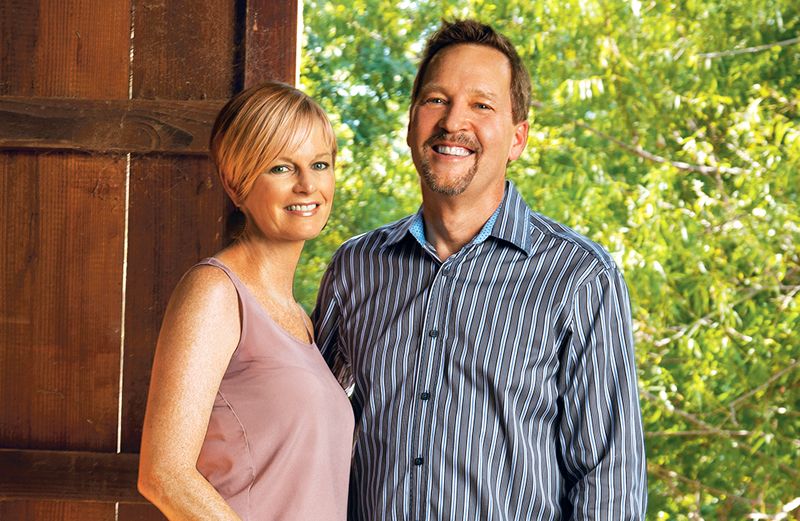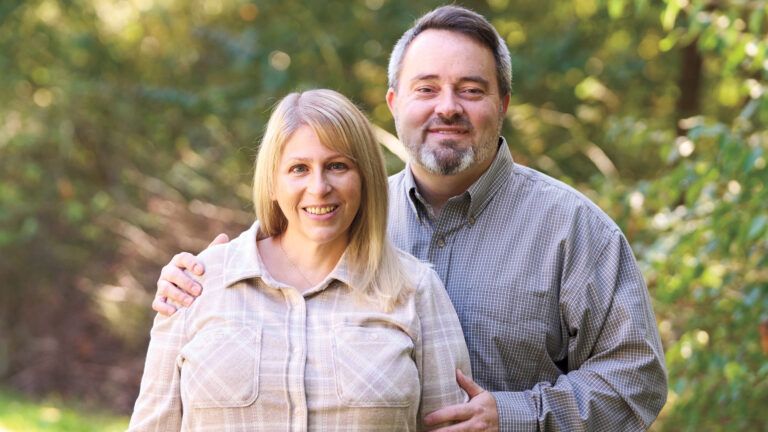Sitting on a park bench, I tried to clear my jumbled mind. Maybe we should go our separate ways. The words echoed in my mind. My husband, Tom, had said them not half an hour earlier.
We’d been in the bedroom getting dressed. Suddenly I saw an expression on Tom’s face I hadn’t seen before. Resignation. Hopelessness.
“Maybe you’re right after all,” he said. “Maybe we are just too different. I don’t think I have the strength anymore to keep trying to make this work.”
Tom and I had never been fighters, but there was constant disagreement. We viewed almost everything differently.
But it had always been me throwing the verbal bombs, not Tom. I made dire threats just to get a reaction out of him. Tom was as steady and imperturbable as he’d been the day we’d married, two decades earlier.
Back then, his calm sense of purpose and his traditional manners had attracted me. I was young and unsure of what I wanted. What I wanted now— what I’d been wanting for years—was more emotion, more passion, more unpredictability. That wasn’t Tom. And so we lived in constant tension.
But go our separate ways? I never expected Tom to say such a thing. His words rocked me so hard I had to get out of the house.
I went for a walk to the park. My mind raced. I tried to pray. I sat on the bench, catching my breath in the cool November air. Was Tom serious? Would he really go through with it?
I hadn’t worked since our kids, now teenagers, were little. Tom had taken a significant pay cut to come here to Houston, leaving a career as a mortgage banker for one managing finances at a Christian foster and adoption agency.
We’d thought getting away from Des Moines, where we’d spent most of our marriage, might help. Obviously it hadn’t.
What now, God? It was all I could think to ask, because I didn’t know what to do. Then three words formed clearly in my head. Wait one year. Wait? Wait for what? I had no idea what the words meant. But something—Someone—seemed to be saying, Slow down.
I raced back to the house, confused about my future with my husband but certain about the message. Tom was still home. I told him about my prayer on the bench. He looked at me, his face unreadable.
“Okay, Amy,” he said. “If the Lord is telling you to wait, we will, and we’ll keep thinking and praying about it. We’ll trust in him and see what he has for us in the next year.”
I nearly collapsed after our conversation. How had we come to this? I knew that I had loved Tom when we married. He was handsome, considerate, sure of himself, a man of faith. I was the flighty one, just out of college, with big, fancy dreams.
We met at a company softball game in Des Moines. I was an intern. Tom was six years older, the company’s controller. Not long after, I took off for Chicago, where I expected to land my dream job and live a big-city life with a big-city husband.
It didn’t turn out that way. The dream job never materialized. Big-city life was tougher than I ever expected. Tom kept in touch. Before I knew it, I was back in Des Moines, and then we were married. Our first child arrived a couple of years later.
Would I have been better off if I’d just stuck it out in Chicago? a little voice in my head sometimes asked. If I hadn’t quit on my dreams? I often fantasized about that other Amy—big-city Amy, who worked in a high-rise and went to the theater with her nightlife-loving husband.
Maybe Tom would have been happier with someone else too. Someone who appreciated him for what he was, a steady, faithful provider. Would waiting a year help me fall in love all over again with that man? I doubted it.
Tom must have doubted it too. We had lots of decisions to make here in our new house—decorating choices, where to send the kids to school, managing money. We were on very different pages; sometimes, it seemed, in different books. And a year was a very long time.
Then, one morning in the shower, I felt a strange lump under my arm. Probably nothing. I got it checked out just to be safe.
“I’m sorry, Mrs. Hauser,” said the doctor. “It’s breast cancer. Stage Two B invasive ductal carcinoma, triple negative. That’s a lot of jargon, but basically it means you have a very difficult form of cancer to treat. We need to start chemotherapy right away. And we need to talk about surgery.”
I drove home in shock. In utter disbelief. Cancer? Along with everything else? I called Tom at work. Of course he didn’t freak out. Tom never freaked out.
“I’ll be right home,” he said. He paused. “Don’t be afraid, Amy. We will beat this. You’re strong.”
I wondered. All I could think of as I waited for him to come home was that if the cancer didn’t kill me, it would certainly finish off our marriage. How could we possibly handle this stress if we couldn’t even agree on the little stuff?
This wasn’t about the balance in the checking account or what color to paint the living room. This was cancer.
But when Tom came home he didn’t look crushed by stress. I could tell he was worried about me. There was something else there too, though, something I hadn’t seen in a long time. Or had I just failed to notice it?
It was as if Tom knew me so well he knew exactly what strength I had to fight cancer—and what he’d lose if I lost the fight.
He got businesslike talking about treatment options. For once I was glad he wasn’t as emotional as me. I could rest in his competence, knowing he wouldn’t falter.
We quickly agreed: start chemo immediately, with a double mastectomy after treatments concluded. Not an easy choice. “We’ll take the fight to the cancer,” Tom said. I loved his resoluteness.
And I needed that resoluteness when chemo started. Following the first treatment I was flat on my back.
“I don’t want you to worry about a thing except recovering,” Tom told me after he’d made up our bed with extra pillows. He caressed my forehead and squeezed my hand before heading to the kitchen to make dinner for the kids.
Already he’d figured out their schedules and made arrangements at work so he could get them to and from school and practices. So organized. So Tom.
We didn’t know many people at our new church in Houston, but word about my illness quickly spread. Of course Tom was on top of it and coordinated meal deliveries and offers of help. He seemed to be everywhere at once.
How did he know when I was thirsty or ready to try keeping down some food? There he was at the bedroom door the moment I needed him. He knew when I needed a back rub, prayers, an encouraging word or just a kiss on the forehead.
I realized that Tom had always been this way, attuned to his family. It was the reason he was so dependable—what I, in my worst moments, had derided as boring. Now I couldn’t help wondering, what if steadiness was as much a sign of love as passion?
I thought back to my early days in Chicago. All those big-city dreams I’d had. But maybe I hadn’t walked out on those dreams. Maybe I’d made the right decision going back to Des Moines. I had to admit, the guys I’d met in Chicago were mostly shallow and self-involved, on the make.
Of course, Tom wasn’t perfect either. Like me, he’d let his disappointment in our marriage slide into grasping at expensive houses and country-club dinners, hoping they would somehow fill the space between us. That’s part of why we moved from Des Moines to Houston and Tom took this new job.
We’d wanted a more godly way of life. Actually, it was mostly Tom who wanted that. He’d sought out this new job, this new city, in a last bid to save our marriage. He gave up only when he concluded I didn’t share his commitment.
But was that still true? Was I really ready to let him go just because he didn’t measure up to my naïve, youthful expectations? Compared with this fight against cancer, all my complaints seemed so petty. But where did we go from here?
Chemo lasted six months. I made it through the tests and surgeries. That November, two days after Thanksgiving, Tom and I were sitting quietly on the back patio, trying not to think about my prognosis.
I’d undergone the final surgery and biopsy just before the holiday. We figured we’d get the results after the weekend. But for now I felt something I hadn’t in a long time—comfortable. I was just sitting here comfortably with my husband. As if some great battle was over.
The phone rang. Startled, I picked it up. It took me a moment to register the doctor’s words: “You’re cancer-free, Amy. You’ve made a remarkable recovery.”
I put the phone down in a tearful daze and told Tom. He didn’t leap to his feet in joy and relief. He didn’t cry. Of course not. That’s not Tom.
Instead he stood up, walked over to me and gathered me in his arms. He held me like that for a long, long time, as if I were a precious object he’d nearly lost and now had found again. I could feel his heart beating against my chest and his arms tight around me, trembling slightly, refusing to let me go.
Suddenly I knew with blinding clarity. This man loved me. He showed his love in his own way. And yes, I loved him. I always had. His steadiness and his devotion had seen us through this disease. Cancer hadn’t killed me. It hadn’t killed our marriage. It had, in a way possible only with God, healed us.
I thought back to that awful day when I escaped the house and went for a walk in the park. Wait one year. With a start I realized it was exactly one year, almost to the day, since God gave me those life-saving words.
He knew then what I didn’t. That at my moment of greatest need, Tom would be there to love me and to hold me up. And that I, fighting for my life, would at last see my husband with unclouded eyes.
Tom pulled back to gaze at me. “I knew you could do it,” he said. “You are so strong, Amy. I love you.”
“I love you too,” I said. And I meant it. More than ever.
Download your FREE ebook, A Prayer for Every Need, by Dr. Norman Vincent Peale






